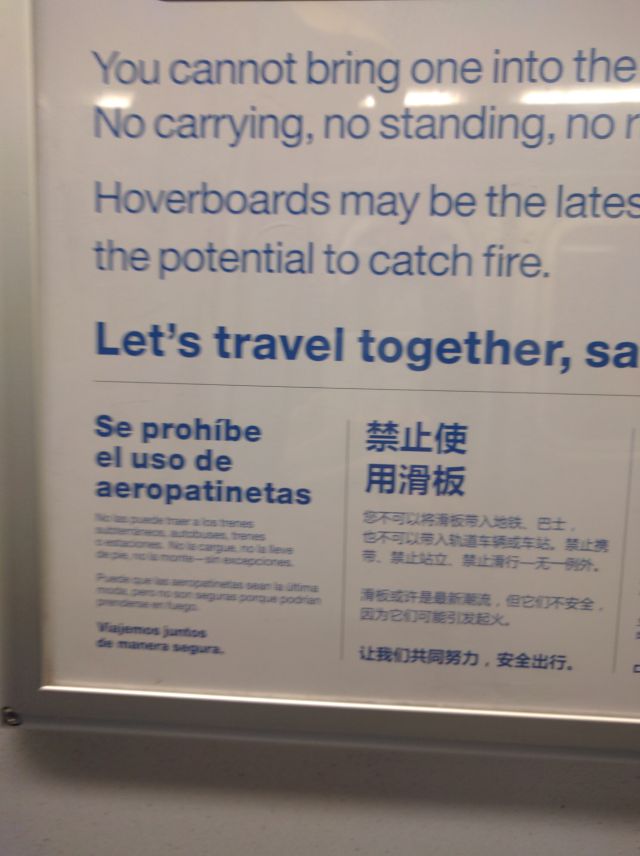Banned through mistranslation
« previous post | next post »
Notice on the New York MTR:
jìnzhǐ shǐyòng huábǎn 禁止使用滑板
("the use of skateboards is prohibited")
The problem with this notice is that what's being prohibited are hoverboards, not skateboards. In Chinese, the former would be xuánfú huábǎn 懸 浮滑板 (lit., "suspended skateboard") or qìdiànbǎn 气垫板 (lit., "air cushion board")
For the whole story and the source of the photograph above, see Nikhil Sonnad, "The New York City subway has banned skateboards—but only if you read Chinese" (Quartz, 3/16/16).
[Thanks to Mark Mandel]

Guy said,
March 24, 2016 @ 6:21 pm
Is it true that hoverboards are generally referred to in other languages by a calque and not by either a more compositionally accurate description or by adopting a loan word? Incidentally, Wikipedia suggests that they were widely sold in China before their popularity in anglophone countries. Was "hoverboard" initially adopted as a calque of the Chinese terms?
Mara K said,
March 24, 2016 @ 7:37 pm
Aren't most of the commercial products referred to as hoverboards just fancy skateboards with motors?
January First-of-May said,
March 24, 2016 @ 10:39 pm
Is it true that hoverboards are generally referred to in other languages by a calque and not by either a more compositionally accurate description or by adopting a loan word?
The modern Russian word for "hoverboard" (or so says Wikipedia) is ховерборд, a straight loan from English.
The term used in the BTTF movies is аэроборд, which seems to be half loan and half composition (and feels like the movie translators needed to make something up on the spot).
Neither is a calque. What would a calque for "hoverboard" in Russian be, anyway – парящая доска? We don't call regular skateboards by a calque either.
Tim Morris said,
March 25, 2016 @ 10:05 am
The Kreyòl on that MTA sign reads "Ovèbòd Entèdi," another direct loan.
Chris said,
March 25, 2016 @ 4:03 pm
I am not surprised. My company used to hold the contract to translate all of these signs and flyers posted around the MTA subway system. We abandoned the contract (let it expire and didn't look back at renewal time) because the MTA pays approximately 3.00 USD to translate each language and desktop publish the flyer, but their source English text often tries to be cute and use double entendre, rhyme humor, slang, their own neologism or portmanteaus, and other basic word play. If you are not familiar with the industry, 3 USD is insultingly cheap for human professionals so providers lied and just started using machine translation. The city created a crowdsourced network of non-professional bilingual city employees working on a volunteer basis, but I don't know for sure if they were used for these projects.
Max said,
March 25, 2016 @ 7:54 pm
The problem is that what's referred to now as a "hoverboard" is not a "suspended skateboard" or an "air cushion board." These things are in the realm of science fiction, most notably the Back to the Future franchise.
Unfortunately for translators, some clever person thought to apply "hoverboard" to what Wikipedia refers to as a "self-balancing two-wheeled board." Maybe that's the case in Chinese too, but it seems like fewer people there would get the reference and they'd have a more accurate term for them.